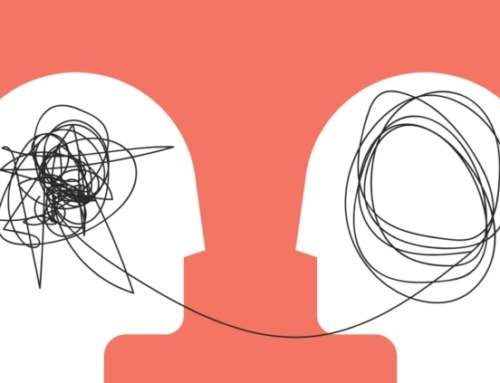Betrayal. So common. We’ve all probably been on the receiving end and perhaps on the committing end too. And among our patients, serious episodes of betrayal are nearly universal.
I wish to focus on betrayal today because to help others heal from it (and to help ourselves heal too if needed), we must understand its true nature. I submit that betrayal’s reach is broader and deeper than we often imagine. I see betrayal like a rhizome (a horizontal underground stem) that sends out stems above ground at intervals. So, just as many seemingly individual plants may be offshoots of a single rhizome, many consequences separated in time relate back to a single episode of betrayal. To explain my view of betrayal I introduce how it plays out over time, in the past and future.
There are two main aspects of the past and future. First, the past and future can be the targets of our thoughts: we can remember the past and imagine the future. Second, the acts of thinking of the past and future take place at certain moments of time. So, for instance, right now at this moment I can think about the past and future; I could have thought about the past and future yesterday; and I can think about the past and future tomorrow. And because these acts of remembering and imagining take place at different times in my life, it’s not surprising that these different times are associated with different views of past events and imagined future ones. In effect, we don’t have one past that simply gets longer the longer we live. Rather we can have as many different pasts as there are moments in a life because our views of the past evolve as we move through life. For example, what I thought about my retirement exactly one year ago differs from what I think about it right now which, in turn, likely differs from what I will think about it a year from now.
“Sure,” you may say, “But you’re talking about a future event – your retirement – and your thoughts about it change with time. Big deal. But the past is different because it is not imagined and what happened really happened.” If you told me this, I would agree with you. But – and here is the crux of my point – we CAN have VIEWS of the past that change over time. It’s not that we indulge in false memories about past events. Rather, our RELATIONSHIP to past events changes as we proceed through life.
This brings me back to the topic of betrayal that I’ll illustrate with an example. Let’s say that two years ago I met a wonderful person with whom I developed a relationship. Then, one year ago – unbeknownst to me – she betrayed me in some way. Imagine also that I only learned about this act of betrayal today.
Now consider what this fact changes in my experience of my entire relationship with my significant other (S.O.) and what remains unchanged. First, it’s easy to imagine that my current moment’s remembrance of the past is now changed because of my learning that I was betrayed. Second, it’s easy to imagine that all the moments of my life going forward in time will also have their remembrances of the past changed too because I will now forever know I was betrayed.
But consider this: Am I likely to say, “Learning of this betrayal today is so painful, I wish I was back to the good old days of this last year when I didn’t know I was betrayed and was able to continue having a good relationship with my S.O.?” After all, before I learned of my betrayal, all this last year I had very positive views of the past and future of my relationship. Maybe until today I even thought that my S.O. and I would one day get married.
The answer is, of course, No. I’m unlikely to think that the last year during which I was ignorant of being betrayed was great because I had positive views of our past and future lives together during that year. More likely, I now retroactively go back and change my view of last year’s moments with their associated views of the past and the future into very negative ones. I feel even more betrayed because I was ignorant over all that time of the true nature of our relationship. It feels as if I was betrayed once from that initial act of betrayal and then repeatedly betrayed at every moment I remained ignorant of it. I blame my betrayer of having robbed me not only of my current happiness and future happiness, but also my past happiness. I go into my past and wipe away all of last year’s happiness.
Now consider a point even further back in time. Am I likely to say, “I wish I could back further in time to that first year of our relationship, to the time before I was betrayed one year ago?” No. I am likely to go back to that earlier time before the betrayal and wipe away my happiness from that time also. The reason is that all those moments of that year preceding the betrayal had their own sense of a future of the relationship, a future that the betrayal took away from me.
So, what we are left with is that the sense of betrayal encompasses my present since I have now learned of being betrayed, my future since I can never forget that I have been betrayed, my past life between the time of betrayal and my present, and my past life between the start of my relationship and the time up to the betrayal. EVERYTHING is affected.
My present, future, and past acts of thinking about my past and my future (as I viewed them then) are affected. There does not remain any untainted time or untainted interactions with my S.O. Everything stinks. It may be difficult for the betrayed person to find any solid and positive ground upon which to rebuild the relationship, if there even is enough motivation to try to do so. It’s possible, of course, to heal the relationship, but the road to healing may be more complex than often the betrayer and betrayed think it is.
This is not happy news, I know. But I think it reflects the reality of our experience of being betrayed. If you want to help people heal from betrayal, it’s crucial to understand betrayal’s ability to change the past’s futures and the future’s pasts. It helps the clinician avoid offering reassurances that will likely sound like platitudes and instead provides the clinician with a more complete understanding of what betrayal can mean to a person. Here I made up an example of an adult being betrayed by another adult. That hurts well enough. But consider when the betrayal occurs in childhood and is perpetrated by an adult whose job it is to care for and love that child. It helps me to think about this when I face difficult patients, such as those with various forms of borderline acting out. Betrayal is hard. It can change a person for a long time and in deep places. Healing from it is a complex process.
Thanks for reading. As always, your comments and feedback are welcome.
Dr. Jack
LanguageBrief
Today’s Quotes
“You teach me now how cruel you’ve been – cruel and false. Why did you despise me? Why did you betray your own heart, Cathy? I have not one word of comfort. You deserve this. You have killed yourself. Yes, you may kiss me, and cry; and wring out my kisses and tears: they’ll blight you – they’ll damn you.”
Emily Bronte, Wuthering Heights“Stab the body and it heals, but injure the heart and the wound lasts a lifetime.”
Mineko Iwasaki“Et tu, Brute?”
William Shakespeare , Julius Caesar







Leave A Comment